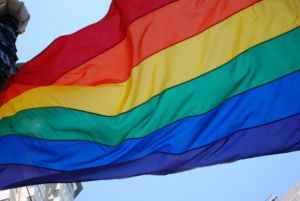 The law is not settled as to whether LGBTQ employees can legally be discriminated against due to their sexual orientation, though most courts have ruled that such discrimination is not covered by Title VII of the Civil Rights Act of 1964. Recently, a federal district court in Pennsylvania ruled that discrimination based on sexual preference is illegal under Title VII, though no appellate court has yet taken that position, and the issue hasn’t been decided by the U.S. Supreme Court. Proposals to amend Title VII, which already prohibits discrimination based on sex, to include a prohibition on discrimination based on sexual orientation have not passed Congress.
The law is not settled as to whether LGBTQ employees can legally be discriminated against due to their sexual orientation, though most courts have ruled that such discrimination is not covered by Title VII of the Civil Rights Act of 1964. Recently, a federal district court in Pennsylvania ruled that discrimination based on sexual preference is illegal under Title VII, though no appellate court has yet taken that position, and the issue hasn’t been decided by the U.S. Supreme Court. Proposals to amend Title VII, which already prohibits discrimination based on sex, to include a prohibition on discrimination based on sexual orientation have not passed Congress.
Appellate Court Decides Not to Include Sexual Orientation Discrimination Under Title VII
Courts appear torn between the explicit language of Title VII, which does not include sexual orientation, and the reasoning of past Supreme Court decisions broadly interpreting Title VII. Applying the same reasoning and logic to cases involving sexual orientation while deciding that sexual orientation isn’t a part of illegal sex discrimination requires a court to tie itself up in verbal and logical knots—which judges normally prefer not to do.
One of the more recent appellate court cases finding that LGBTQ employees cannot apply for protection under Title VII is Hively v. Ivy Tech. The court’s opinion, published in July 2016, states that the court is bound by its prior decisions, consistent with other appellate decisions, finding that sexual orientation is not covered by the law.
The court noted that Congress has repeatedly failed to change Title VII to include sexual orientation, arguably showing an intent that protection should not be expanded. In doing so, Congress has rejected the argument that discrimination based on sexual orientation must necessarily involve sex discrimination, because if the employee had been of a different sex, he or she would not have suffered an adverse employment action.
The court reasoned that this illegal “sex stereotyping,” which was the basis of the U.S. Supreme Court decision in the Price Waterhouse v. Hopkins case, where an employee was discriminated against because she wasn’t seen as sufficiently feminine and submissive, doesn’t necessarily cover sexual orientation claims. Specifically, the court held that
Although it seems likely that most of the causes of discrimination based on sexual orientation ultimately stem from employers’ and co-workers’ discomfort with a lesbian woman’s or a gay man’s failure to abide by gender norms, we cannot say that it must be so in all cases. Therefore we cannot conclude that the two must necessarily be coextensive unless or until either the legislature or the Supreme Court says it is so.
District Court Decides to Include Sexual Orientation Discrimination Under Title VII
 The one court that has so far decided to include discrimination based on sexual orientation under the protections of Title VII is the Western District of Pennsylvania. In that case, the federal Equal Employment Opportunity Commission (EEOC) sued the Scott Medical Health Center in federal court in March 2016. The EEOC claimed that the medical center had discriminated against an employee, Dale Baxley, by creating a sexually hostile work environment, ultimately forcing him to quit his job. The medical center asked the court to dismiss the case because it claimed Baxley was discriminated against only due to his sexual orientation, which isn’t covered by Title VII. In November 2016, the judge decided not to dismiss the case, holding that the allegations are covered by the law.
The one court that has so far decided to include discrimination based on sexual orientation under the protections of Title VII is the Western District of Pennsylvania. In that case, the federal Equal Employment Opportunity Commission (EEOC) sued the Scott Medical Health Center in federal court in March 2016. The EEOC claimed that the medical center had discriminated against an employee, Dale Baxley, by creating a sexually hostile work environment, ultimately forcing him to quit his job. The medical center asked the court to dismiss the case because it claimed Baxley was discriminated against only due to his sexual orientation, which isn’t covered by Title VII. In November 2016, the judge decided not to dismiss the case, holding that the allegations are covered by the law.
According to the complaint, Baxley’s supervisor, Robert McClendon, harassed him repeatedly. McClendon “routinely made unwelcome and offensive comments about [Baxley]…calling him ‘fag,’ ‘faggot,’…and ‘queer,’ and making statements such as ‘f–ing queer can’t do your job.’” These types of comments were made at least three or four times a week. After learning Baxley was gay and had a male partner, McClendon made comments about his relationship, including “Who’s the butch and who is the bit–h?”
McClendon was an equal opportunity harasser: the EEOC learned of Baxley’s situation while investigating sexual harassment and discrimination complaints made by five former female co-workers. In Baxley’s case, the EEOC found that he complained to management about the treatment but they did nothing to stop it.
Judge Cathy Bissoon ruled that the allegations were covered by Title VII because
the singular question [was] whether, but for Mr. Baxley’s sex, [he would] have been subjected to this discrimination or harassment. The answer, based on these allegations, is no…. The Court holds Title VII’s “because of sex” provision prohibits discrimination on the basis of sexual orientation…. The Court sees no meaningful difference between sexual orientation discrimination and discrimination “because of sex.”
Judge Bissoon further explained that over time the U.S. Supreme Court has broadened the meaning of sex discrimination, including a case where a male employee was sexually harassed by other male employees. Similarly, in the Price Waterhouse case, mentioned above, the problem was that the plaintiff didn’t conform to what management thought a woman should do or be. “There is no more obvious form of sex stereotyping than making a determination that a person should conform to heterosexuality,” Bissoon wrote. Therefore,
[T]he Court finds discrimination on the basis of sexual orientation is, at its very core, sex stereotyping plain and simple; there is no line separating the two…. It is…a distinction without a difference. Forcing an employee to fit into a gendered expectation—whether that expectation involves physical traits, clothing, mannerisms or sexual attraction—constitutes sex stereotyping and, under Price Waterhouse, violates Title VII…. The Supreme Court’s recent opinion legalizing gay marriage demonstrates a growing recognition of the illegality of discrimination on the basis of sexual orientation.… That someone can be subjected to a barrage of insults, humiliation, hostility and/or changes to the terms and conditions of their employment, based upon nothing more than the aggressor’s view of what it means to be a man or a woman, is exactly the evil Title VII was designed to eradicate.
Summing It Up
The Scott Medical decision may be appealed, and the issue may ultimately be decided by the U.S. Supreme Court. A key issue for Baxley is that Pennsylvania law doesn’t cover employment discrimination on the basis of sexual orientation. Neither does Virginia law, though discrimination based on sexual orientation is prohibited by Maryland and District of Columbia laws.
No matter where you work, if you believe you’re being discriminated against because of your sexual orientation,
- Federal law may be evolving and may eventually be interpreted as covering sexual orientation,
- Maryland or District of Columbia law may apply, or
- There may be other types of legal violations, such as retaliation, that may apply to your case.
If you have any questions about illegal workplace sex discrimination in general, or sexual orientation discrimination in particular, contact our office so we can talk about your situation, what laws may cover you and your employer, and your best options to protect yourself and your legal rights.





